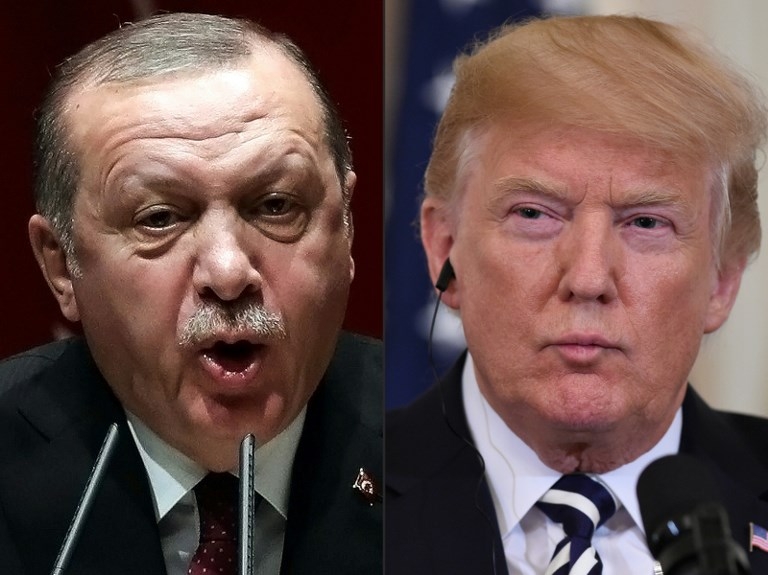Erdogan says he asked Trump to set up joint review of contentious S-400 deal with Russia

US President Donald Trump and his Turkish counterpart Recep Tayyip Erdogan have discussed a proposal to establish a joint committee to examine Turkey's plans to purchase Russian-made S-400 missile systems, the Turkish president's office said.
During a phone call with Trump on Monday, Erdogan personally offered to create a joint group to review the contentious sale, his office said in a statement.
The statement did not say how the group would work to resolve the issue, which has been a longstanding source of conflict between Turkey and the United States.
Washington and Ankara have been at odds over the sale since 2017, when Turkey first announced plans to buy the Russian missile defence system despite opposition from its NATO allies.
US officials, including senior members of the Trump administration, have repeatedly urged Turkey to abandon its deal with Russia in recent weeks.
They say Turkey's use of Russian-made S-400 systems could compromise US-made F-35 fighter jets, and allow Moscow to gain access to critical data.
Ankara has remained firm, however, with Erdogan previously saying the $2.5bn agreement with Moscow is a "done deal".
The White House confirmed on Monday that Trump and Erdogan had discussed Turkey's planned purchase of the S-400 missile defence system, according to Reuters.
The Trump administration has not yet commented publicly on whether the US is considering the Turkish proposal to form the joint working group.
In early April, Reuters reported that Turkey had offered to set up a technical committee under the NATO umbrella to determine whether the S-400 system endangers F-35 jets, as the US argues.
That offer was rejected by Washington, the news agency said. "A technical working group at this stage is not necessary or a path the United States is considering as a resolution," Pentagon spokesman Eric Pahon said on 4 April.
US sanctions
Earlier this month, US Secretary of State Mike Pompeo said Washington told Ankara it could face retribution for buying the S-400 systems under a sanctions law known as Countering America's Adversaries Through Sanctions Act (CAATSA).
Turkish officials argue that Turkey should receive a waiver to avoid the sanctions since it signed the S-400 deal well before CAATSA was ratified.
The Turkish government is a partner in the F-35 programme, and has already paid more than $1.2bn into its development.
Currently, four F-35 jets that Ankara has already purchased remain in the US, as American legislation bars their physical transfer to Turkey until a solution is found to the diplomatic crisis.
Sources in Turkey told MEE this month that the government was open to finding a solution that would be mutually acceptable to everyone and that wouldn't violate Turkish sovereignty.
Still, tensions remain high between Washington and Ankara over the deal.
Exacerbating the situation is a US decision to stop issuing waivers to countries so they can keep buying Iranian oil despite Washington's sanctions on Tehran.
Turkey is working on a mechanism to avert those US sanctions, risking another showdown with Washington, as the Trump administration's waiver decision is set to take effect later this week.
The Turkish president's office did not say whether Erdogan and Trump discussed that issue in their call on Monday.
Middle East Eye delivers independent and unrivalled coverage and analysis of the Middle East, North Africa and beyond. To learn more about republishing this content and the associated fees, please fill out this form. More about MEE can be found here.





